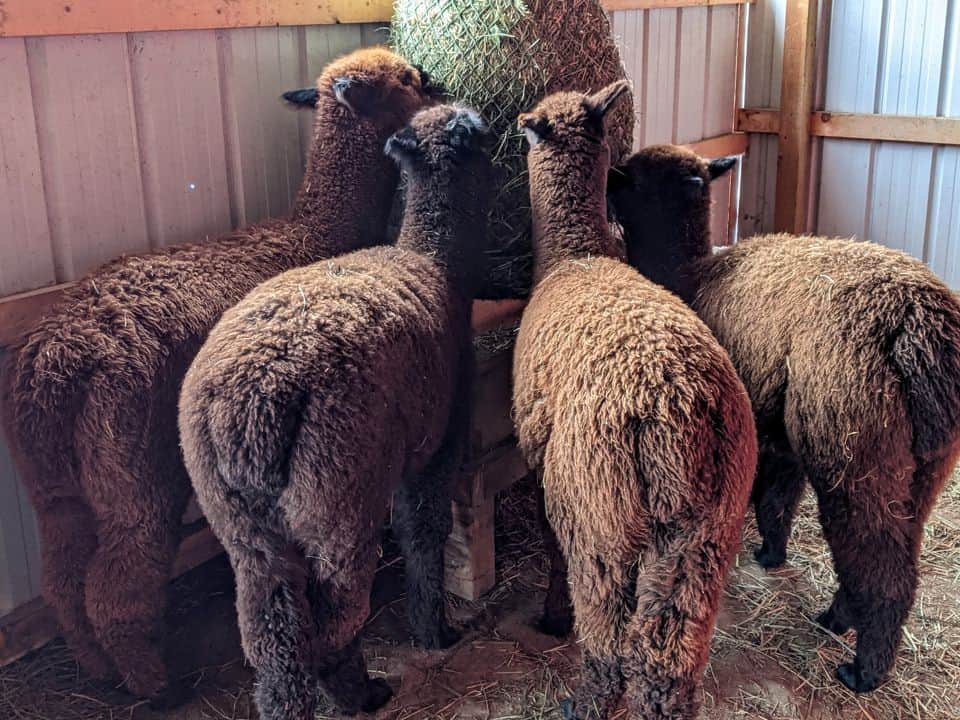
The first alpacas arrived in Canada in the late 1980s. However, the first large importation, consisting of alpacas originally imported from Chile and purchased by a small group of Canadian alpaca farmers and investors, landed in Canada on January 2, 1992. These animals had been quarantined in New Zealand for one and a half years before arriving. A 747-cargo plane then flew the 362 alpacas from Auckland , New Zealand to the international airport at Nisku , Alberta where 170 of them were dropped off at the Nisku federal quarantine facility. The rest were flown to Mirabel , Quebec , where another federal quarantine facility is located. After 150 days in federal quarantine, the alpacas were released to six on-farm quarantine facilities across the country where they remained for another one and a half years before being formally released by the Canadian government. The Canadian alpaca industry truly began with the dedication of these first few intrepid farmers and investors.
A strong breed association known as the Canadian Alpaca Breeders Association (CABA) was formed very early on by these original alpaca owners. This original association had members from across the country and was actively involved in public awareness and education activities, as well as in promoting the development of the alpaca breeding and fibre industry.
The Canadian Llama Association, which originally only administered a registry for llamas, set up a similar registry for alpacas, and in 1996 the association formally changed its name to the Canadian Llama and Alpaca Association (CLAA). The CLAA was also responsible for setting and supervising screening standards which would ensure that the quality of imported, non-pedigree alpacas entering the registry would be a positive influence on the make up of the national herd. As of Dec. 31, 2000, the Canadian registry has been closed for the registration of non-pedigree alpacas. It should also be noted that federal government legislation governs the running of livestock registries in Canada and prevents the establishment of any competing registries in Canada.
The Canadian alpaca industry enjoys a great deal of credibility because each animal that has been entered into the registry has been blood typed or DNA processed. This gives tremendous certainty to the pedigrees of Canadian registered alpacas. While this was an expensive first step for a budding industry, it has provided a very solid foundation for an industry Canadians can be proud of.
In 2005 The Canadian Llama and Alpaca Association decided it would best support its membership if it was to create two separate divisions. Alpaca Canada and Llama Canada . Alpaca Canada has absorbed CABA and assumes the responsibility of continuing the work CABA began. All non registry (CLAA) related areas of business will also be the responsibility of Alpaca Canada.
The Canadian alpaca industry has flourished from birth. In the last few years we have had additional importations from Chile , Peru and Bolivia . As well, smaller numbers have come in from Australia and the United States . Our national herd in January, 2006 numbered 16, 373. CLAA registered alpacas.
Canadian alpacas are shorn annually and their fibre is processed into a number of products. Several mills in Canada are capable of spinning a good quality yarn from our home grown fibre. Many of the sales of this fibre are to the cottage industry - the artisan markets of hand spinners, weavers and knitters. Local alpaca fibre is also being sold at the farm gate by producers, as well as through mail orders and wholesale operations.
The Alpaca Fibre Co-operative of North America (AFCNA) is an agricultural, member owned co-op as well. Headquartered at 17494 State Highway 58 N, Decatur, Tennessee, AFCNA seeks to build a large volume, commercial and consumer alpaca fibre product industry for all grades of member alpaca fibre; as well as provide members with a wide array of Peruvian and North American alpaca fibre products (including Marketing Division products) at wholesale prices.
There are a growing number of alpaca product specialty stores handling local as well as imported alpaca products. As the North American market for alpaca fibre grows and develops, we are expanding to the commercial level.
A show circuit, as well as fleece shows for alpacas has developed in Canada . Public awareness of our industry has grown tremendously in the last few years. As an opportunity for agricultural diversification, or as a hands off investment, the alpaca in Canada is certainly finding its niche. There are 510 registered alpaca farms and ranches in Canada at present and that number is continuing to grow.
Given Canada's pre-eminent registry system, the high quality and diverse nature of the genetic make up of our national herd, and the positive prospects for the alpaca fibre industry in Canada, the future of the alpaca in Canada is assured. The industry can expect to grow and flourish in the new millennium.
For information about alpaca care, fibre production and more, please complete the request form.